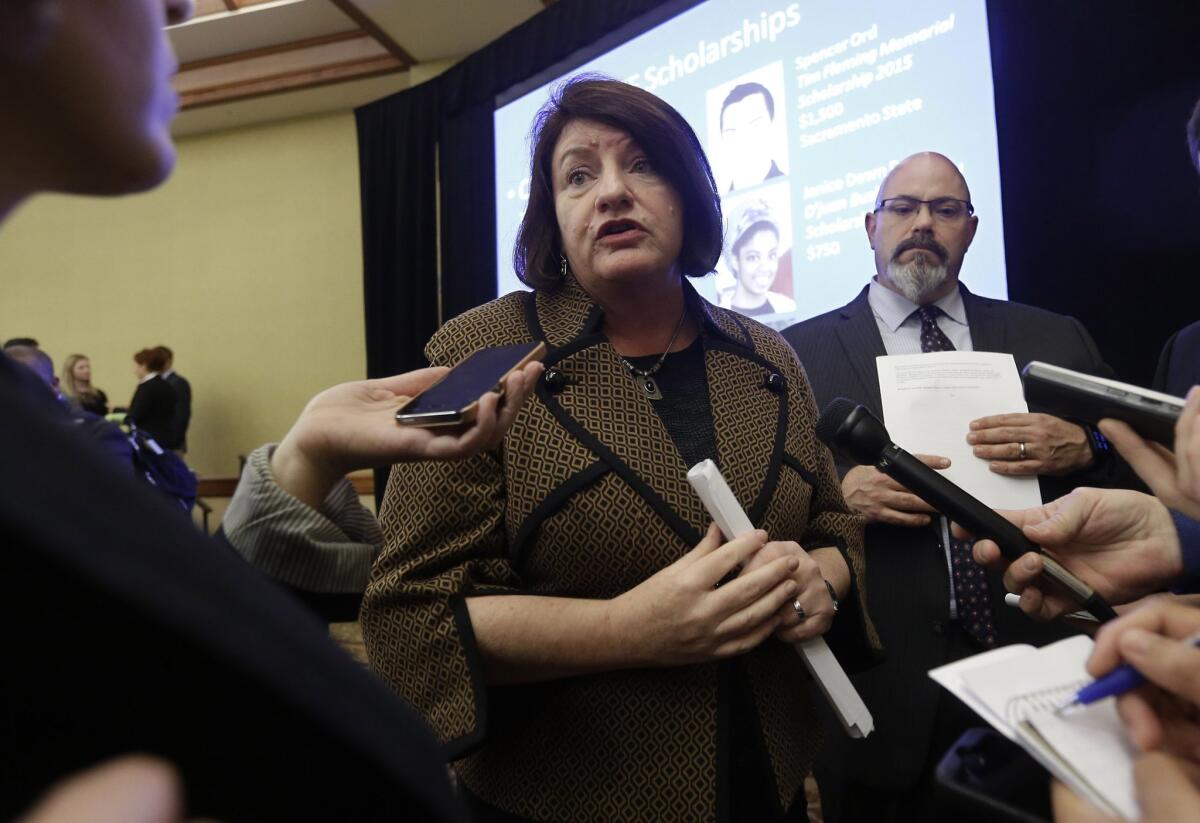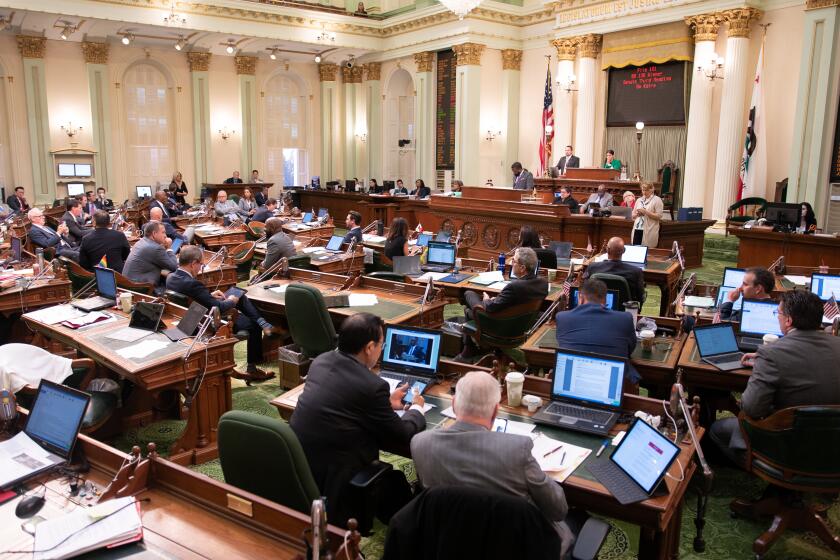In defying Newsom, she tried to protect California from Trump — and showed how legislating should work

- Share via
SACRAMENTO — Combine Friday the 13th with a full moon and weird things can happen — good and bad.
We saw this Friday when the California Legislature passed scores of bills — most of them without any semblance of debate — before adjourning for the year about 3 a.m. Saturday. Nothing unusual about that.
But one very good thing that occurred — regardless of your view about her bill — was a normally low-key Senate leader standing up to a powerful new governor of her own party.
That’s rare in Sacramento and Washington. Governors and presidents almost always are deferred to by legislative leaders of their party. When was the last time that you recall U.S. Senate Majority Leader Mitch McConnell (R-Ky.) bucking President Trump?
Leaders almost always knuckle under because a chief executive has a full kit of tools designed for rewarding or punishing. And lawmakers prioritize party unity over functioning as a separate, equal branch of government exercising its constitutional role as a check and balance.
On Friday, state Senate leader Toni Atkins (D-San Diego) showed us how a healthy, productive legislature works — one that independently pushes its own ideas about public policy and leaves it to the governor to decide whether to sign or veto a bill.
Atkins rejected Newsom’s request to shelve her landmark anti-Trump environmental protection measure, SB 1. Then she rammed it through both legislative houses within hours.
“We are living in times that demand our urgent action to protect our state’s resources, our environment and worker safety,” Atkins told the Senate before it passed the measure, 26 to 14. Earlier, the Assembly passed it 43 to 21.
Her underlying message to the governor: This isn’t simply one-party rule in Sacramento with unified Democrats in the legislative and executive branches acting in unison. Sometimes, government will function as our founders intended: as separate, independent branches disagreeing with each other and acting on their own.
A few hours later, Newsom exercised his gubernatorial power by announcing he’ll veto Atkins’ bill — siding with the Trump administration, San Joaquin Valley farming interests and the influential Metropolitan Water District of Southern California. U.S. Sen. Dianne Feinstein (D-Calif.), long an ally of valley agriculture, also adamantly opposed the bill.
Siding with Trump wasn’t how Newsom characterized it. But it was the result.
Left in the cold were Democratic leaders in the Legislature, Los Angeles Mayor Eric Garcetti and environmental groups who strongly backed Newsom’s gubernatorial bid.
California lawmakers tackled policing, environmental and labor rules in 2019. Will those fights last into 2020?
“I fully support the principles behind Senate Bill 1,” Newsom’s statement read. “[It] does not, however, provide the state with any new authority to push back against the Trump Administration’s environmental policies. And it limits the state’s ability to rely upon the best available science to protect our environment.”
Balderdash.
Atkins’ bill does provide tools to push back against Trump’s weakening of environmental, public health and work safety protections. Essentially, any federal protections Trump gutted would become state regulations. That affects the federal Central Valley Project — a provision of the bill heatedly opposed by the feds and farmers — and the State Water Project.
As for Newsom’s second point, valley agriculture’s notion of “best available science” is anything that would rationalize the pumping of more irrigation water from the fragile Sacramento-San Joaquin River Delta.
Trump intends to weaken the federal Endangered Species Act, which guarantees enough fresh water flows through the delta to protect threatened Chinook salmon and steelhead trout. The president has vowed to generate more water for valley farms. Atkins’ bill would adopt the pre-Trump federal act as California’s own.
Newsom does appear to have one valid concern about the bill, although he didn’t mention it in his veto statement.
Water districts that depend on the federal Central Valley Project have been negotiating with state regulatory agencies to obtain greater pumping flexibility in the delta. But they threatened to walk out of talks if SB 1 became law. Newsom supports the negotiations and was afraid they’d be derailed.
The normally liberal governor naturally is also trying to cozy up to Republican-leaning San Joaquin Valley growers.
Atkins didn’t decide whether to confront Newsom until Friday night —shortly after the very bad, weird thing happened.
A vaccine protester, demonstrating in the Senate balcony with other anti-vaxxers, dropped a menstrual cup containing what appeared to be blood onto the chamber below. The liquid splattered on the maroon carpet, some desks and a few senators’ heads.
Senators abandoned the chamber and reconvened in a large committee room.
The anti-vaxxers have been a pain for months — and ineffective in advancing their cause. They have been obsessed by legislation the governor signed to impose new state controls over suspected unscrupulous doctors who have been peddling medical exemptions for childhood vaccinations.
The bill’s author, Sen. Richard Pan (D-Sacramento), was shoved from behind on the sidewalk by one anti-vaxxer. He has been compared frequently to Hitler. Protesters have screamed during committee hearings and floor sessions. Then came the blood tossing.
As what usually happens when the Legislature is attacked — a disgruntled trucker drove his big rig into the Capitol below the Senate in 2001, armed Black Panthers invaded the Assembly chamber in 1967 — security will be tightened. And the grand old building will become even more a vault-like fortress. And it should, given last week’s madness.
But kudos to Atkins for working around the loonies and standing up to the mighty governor.
Hopefully this exercise of independence will happen again before the next full moon on a Friday the 13th.
More to Read
Sign up for Essential California
The most important California stories and recommendations in your inbox every morning.
You may occasionally receive promotional content from the Los Angeles Times.












